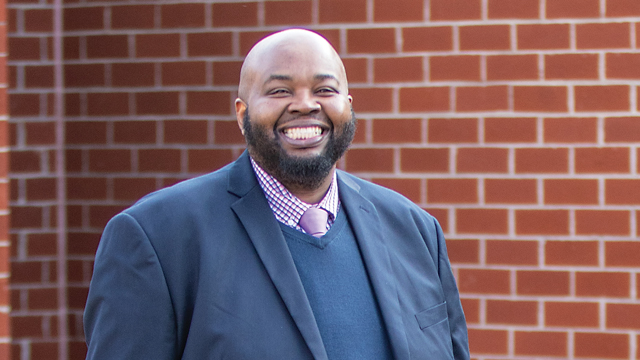Rodney Robinson’s broad smile is infectious in the best possible way. And these days, Robinson has good reason to smile. After nearly two decades of teaching for Richmond Public Schools, Robinson has received the profession’s oldest and most distinguished honor: National Teacher of the Year.
After graduating from Virginia State University in 2000, Robinson began his career teaching social studies at Lucille M. Brown Middle School. He then taught for two years at George Wythe High School and twelve years at Armstrong High School. Four years ago, Ta’Neshia Ford, Robinson’s former colleague at Armstrong, urged him to join her at the Virgie Binford Education Center, where she is now the principal.
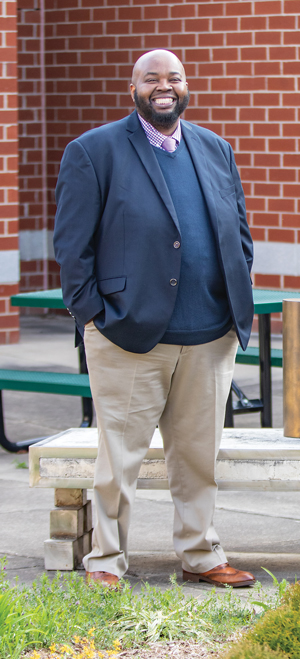
Because Virgie Binford is part of Richmond’s Juvenile Detention Center, Robinson’s new job was very different from his previous post at Armstrong. Unlike the AP courses he was used to teaching, a single class at Virgie Binford can have students ranging from sixth to twelfth grades and can include students with special needs, as well as students requiring advanced curriculum.
Robinson welcomes the challenge, though. “Kids in detention deserve good teachers,” he says. “They need it more than anybody else.”
After years of tireless work building relationships with students and helping them see value in education and learning, Robinson is honored to have achieved national recognition and with it, the opportunity to travel the country sharing his story, his students’ stories, and his mission to increase diversity in the teaching profession.
Transforming Lives Through Education
As a child, Robinson’s mother Sylvia wanted to become a teacher, but segregation and poverty prevented her from realizing her dream. Instead, she worked long days running a childcare while raising Robinson and his four older siblings in King William County.
When Robinson was in high school, his mother began pursuing her GED. After football practice, Robinson would wait in the back of the classroom to ride home with her. While sitting there watching her, he witnessed the stress of working more than forty hours a week and raising five kids melt away. “I was watching my mother enjoy learning and go to another place,” he says. “It inspired me to want to teach and take other people to that place.”
By high school, Robinson had already decided he would do what his parents couldn’t and attend college. Years earlier, he had voiced doubts to his family about whether college was for him. In response, his father, Elmore, signed him up to work on a farm for a day. In less than two hours, Robinson had returned home, determined that college was a better path.
In middle school and high school, Robinson succeeded academically and participated in the honors program, but that kind of achievement made school complicated. “I was smart, and when you’re on that smart track, you get pushed, but you’re getting separated from your best friends,” says Robinson. “I was one of the few black kids in the honors program, so that created some confusion growing up.”
A saving grace for Robinson was his one male African American teacher, music teacher and band director Calvin Sorrell. Robinson took music classes with Sorrell whenever he had the chance. “He taught me to navigate life as an African American male,” says Robinson. Sorrell provided a valuable perspective for Robinson and, through his positive influence, reaffirmed Robinson’s desire to teach.
Sharing a Passion for History
Once Robinson decided to teach, he had to decide what to teach. It didn’t take too long for him to settle on history. “I was really good with math, but that was too concrete,” Robinson says. “I like to argue and debate.”
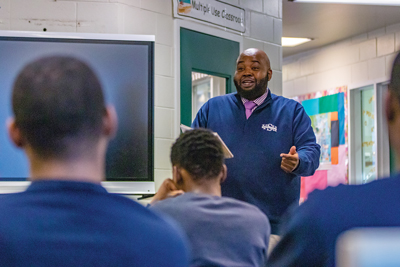
Robinson had always been interested in World War II and the Korean War. His maternal grandfather, who passed away when Robinson was five, had fought in Europe in World War II. Although Robinson’s grandfather liked his solitude, he let the young history buff play with his medals, forging a special connection that stuck with Robinson. “My grandfather never talked about the war, so I wanted to learn about it,” Robinson says. “Studying World War II was a way to connect with my grandfather.”
As his teaching career has developed, his passion for history has evolved to focus on opportunities to develop civic-minded students who dig deep to analyze primary sources and find voices that typically lack representation. Robinson says he hasn’t used textbooks since his first
or second year of teaching because they teach students what to think. Robinson sees his job as teaching students how to think.
Two of Robinson’s former students, Hubert Anderson and Doron Battle, have become teachers themselves, in part because of Robinson’s influence. Both praise the effectiveness of Robinson’s teaching methods. “He made history fun and related it to everyday life,” says Anderson, who took Robinson’s eleventh grade U.S. history class. Battle agrees that the methods Robinson used, including engaging students through a variety of media, made it easier for the students to understand and remember what they had learned. “We had no choice but to thrive,” Battle says.
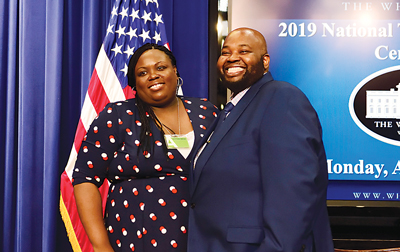
While teaching his students how to think, Robinson continually builds his own academic skills. He graduated from Virginia State University in 2000, and later, pursued his master’s in administration and supervision at VCU and received his principal’s license in 2011. He has also participated in the Yale National Initiative to strengthen teaching in public schools. A highlight for Robinson was a course taught by James Forman, Jr., the distinguished J. Skelly Wright professor of law at Yale Law School, entitled “Race, Class, and Punishment.” The assignment involved developing a 10,000-word curriculum for his students. For that course, Robinson created a curriculum about the history of the Virginia judicial system to help his students at Virgie Binford Education Center better advocate for themselves within the judicial system.
Educating the Whole Child
Teaching his students how to navigate the judicial system reflects Robinson’s mission to educate the whole child. When he first started working at Virgie Binford in 2015, he was shocked to see two students in his classroom at the detention center who had failed his class at Armstrong High School. “That was a pretty powerful first day,” says Robinson. “It opened my eyes and got me looking at practices in school and changed my philosophy of education.”
Those changes included not only becoming more patient, but also adapting his grading system. “Some of my students [at Armstrong High School] had failed because they had gotten zeros for being absent,” Robinson says. “I don’t give zeros anymore.”
When Robinson started teaching at Virgie Binford four years ago, he altered the students’ environment, changing it from institutional to inspiring. He covered the bare, white walls with images of and inspiring quotes from a range of prominent and successful African Americans, including Former President Barack Obama and First Lady Michelle Obama, Thurgood Marshall, singer Jennifer Hudson, and others. “These displays are instrumental in creating and maintaining a comfortable learning environment in our detention facility,” says Principal Ta’Neshia Ford.
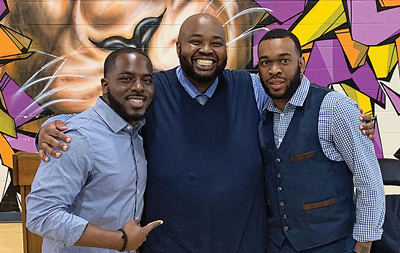
But taking into consideration the whole child means more than decorating the walls and changing the grading system. It also requires teachers to focus on students’ emotional health. “I have to take the students’ feelings into account,” says Robinson. The veteran teacher knows, for instance, that Thursdays are rough days at Virgie Binford. “Wednesday is the day they spend with their families,” Robinson says. “On Thursdays, they’re upset they’re not with their families, so you have to be careful about how you approach them that day.”
Robinson‘s students are at the center for varying periods of time because of their legal situations and not for academic pursuits. Because he gets to know his students so well, Robinson laments that he cannot maintain a relationship with them after they leave the center, per juvenile detention center policy. “It’s hard to let them go and not stay in contact,” says Robinson, “but I check their progress through other teachers.” In the past, some of his students have violated probation to return to Virgie Binford and talk to the staff about the challenges they are facing. “For some students, these are the best relationships they’ve ever had,” says Robinson.
The relationships at Virgie Binford are so strong because staff members like Robinson focus on helping them develop as people. “In our alternative school setting, having someone who is so conscientious and non-judgmental is so important,” Ford says.
That unconditional support for students is what makes Robinson special, according to Jason Kamras, superintendent of Richmond Public Schools, who was National Teacher of the Year in 2005 when he taught in Washington, DC. “Robinson is everything every parent wants from a teacher,” says Kamras, “because he cares so deeply and is so invested in the academic, social, and emotional growth of the kids.”
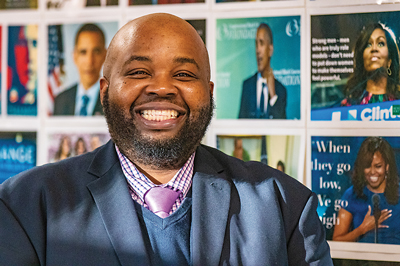
Kamras and Richmond Public Schools recently honored Robinson and his commitment to educating the whole child by creating the Rodney A. Robinson Equity in Education Award. Equity in education – providing the resources and support each student needs to succeed – is a central tenant of Robinson’s platform as he travels the country this year.
Robinson knows firsthand the value of a school official who believes in his students. When he was about to graduate from high school, Robinson got in trouble for overturning a desk in response to a teacher’s offensive comment. Wayne Lewis, his vice principal at the time, was the first African American administrator in the school. Instead of expelling Robinson, Lewis used the event as a teachable moment. “He took a moment to understand my teenage angst and encouraged me to direct that anger toward something positive,” Robinson says. “He even helped me fill out an application and financial aid forms for Virginia State University.”
Encouraging Diversity in Teaching
Having a male African American teacher and administrator significantly impacted Robinson’s school experience and enabled him to envision a future for himself that differed from what the men in his family had experienced. Principal Ford sees Robinson having that same kind of impact on his students. “It is so powerful to witness Mr. Robinson’s interactions with young men of color in his classroom and in our environment as not only a historian, but as a man of color who is an educator,” says Ford. “Students need to see themselves in those who teach them.”
Research bears out the positive impact teachers of color can have on students of color. “Kids are 39 percent less likely to drop out of school if they have a teacher of color in the early grades,” says Robinson, “and they are 18 percent more likely to go to college.” A 2016 report from the U.S. Department of Education, however, says that black male teachers only make up about two percent of all teachers.
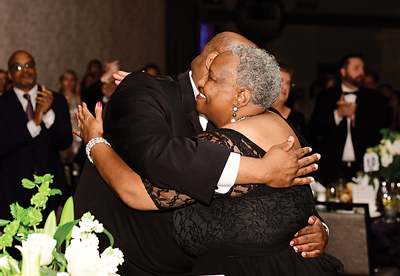
Robinson hopes to change those statistics, starting with his own students over the years. When Doron Battle was working at the Beaumont Correctional Center, he reached out to his mentor and former teacher. Battle felt exhausted and frustrated and needed advice on where
to go next. Robinson encouraged Battle to consider teaching in Richmond Public Schools. Battle took Robinson’s advice and pursued a master’s degree in special education. He now teaches at George Mason Elementary School in the neighborhood where he grew up, and he strives to make a difference in his students’ lives the way Robinson impacted him.
When Hubert Anderson returned to Richmond Public Schools several years ago as a fifth-grade teacher, he wanted to make a difference in kids’ lives, but he felt overwhelmed. “When I first started, I didn’t know what I was doing,” Anderson says. “Then I thought about what Robinson did and how he conducted his class.” Of all the teachers he had throughout high school and college, Anderson thought about the man known among students as “Big Rob.” After joining the teaching profession, Anderson ran into Big Rob at a local event. “When I told him I was teaching,” Anderson says, “he gave me a big smile.”
Given their experience having Robinson as a teacher and mentor years ago, neither Anderson nor Battle is surprised to see him as National Teacher of the Year. “Big Rob has had the same ideology forever,” Battle says. “He was destined for this.”
Anderson agrees. “Even if he wasn’t getting accolades, he would be doing the same thing he’s doing now. He’s a teacher at heart.”
His present-day students feel the same way. One student at Virgie Binford explains the role Robinson plays in her life: “Anytime I doubt myself, Mr. Robinson will tell me I am wrong, and that I can do it. It is comforting to know someone believes in me.”
Photo: Tim Nuthall, Richmond Public Schools


